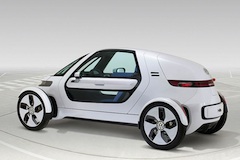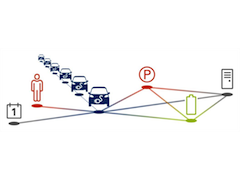| Collaborative e-Vehicles |
 |
 |
 |
|
The e-mobility case study aims at illustrating the theories and methodologies developed in ASCENS in the domain of e-mobility planning. Driver, vehicle and infrastructure are considered as interacting autonomous Service Components, which are temporally re/organized in Service Component Ensembles to reach a goal. In order to provide a user with a seamless daily travel plan, a sequence of destinations with possibly different travel modes and resource requirements are scheduled. The main intention is to provide benefits for the individual vehicle and its driver as well as for the whole ensemble of vehicles. Particular attention is paid to the performance criterion of providing a high-level Quality of Service (QoS) that incorporates the following features: Reliability (e.g. transport/delivery reliability, adherence to schedules, guarantee to reach the goal, recharging-in-time assurance), adaptation to changes (e.g. traffic flow, daily personal schedule of the driver) and predictability (confidence in reaching a desired location at a requested time).
|
| Last Updated on Thursday, 12 March 2015 20:01 |




